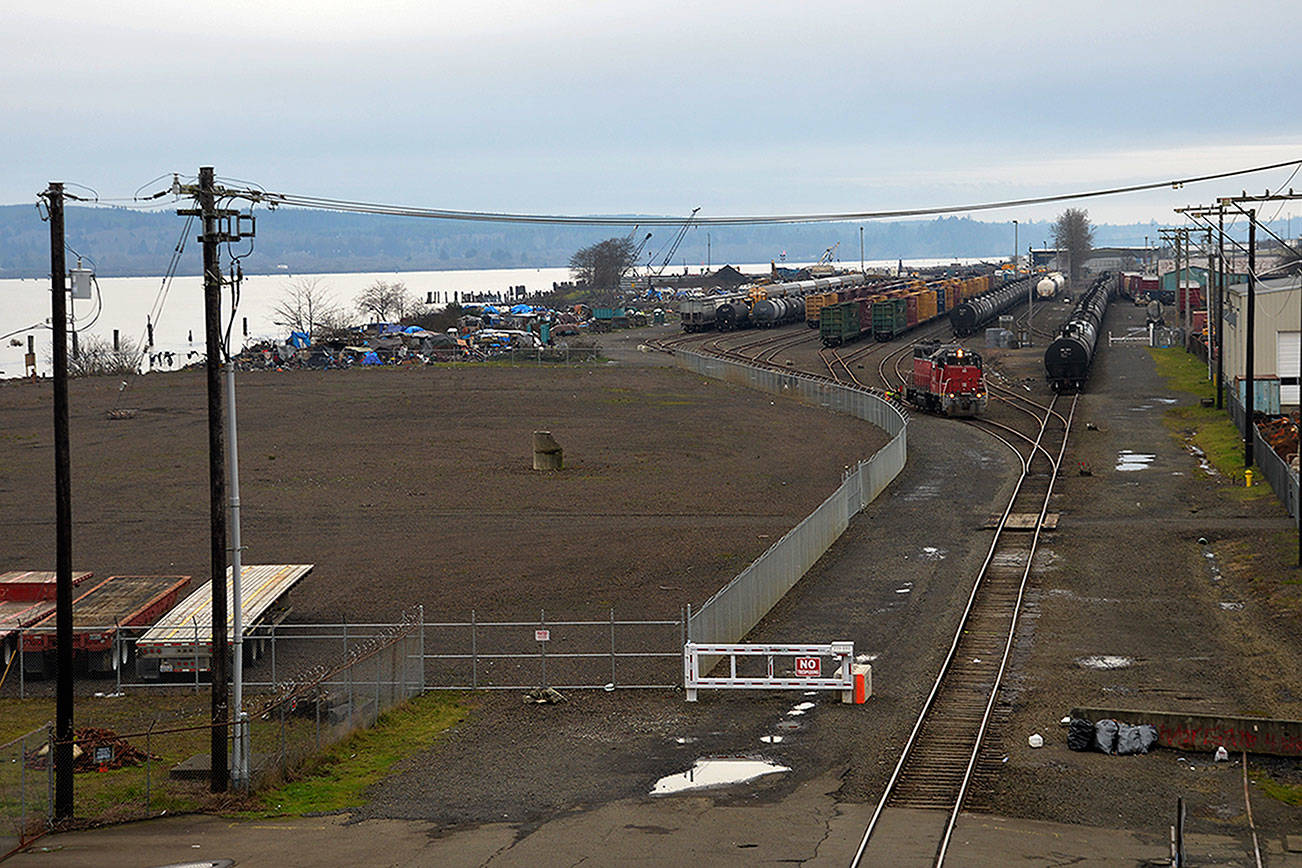Anyone can freely visit Aberdeen’s riverfront homeless camp during certain hours each day, now that a judge has approved new policies as part of a federal lawsuit against the city for its management of the camp.
The policies — drafted and agreed upon by both parties in the lawsuit — eliminate the city’s controversial visitor permit system for the homeless encampment, where over 100 people are living in tents, vehicles and makeshift shacks between railroad tracks and the Chehalis River.
Under the new rules, visitors can enter the riverfront property any time between 8 a.m. and 8 p.m. for non-emergencies, and no longer need permission from the city to enter. U.S. District Judge Ronald Leighton approved the changes in a proposed motion Wednesday.
In place of the permit system, there are new time, manner and place restrictions for the homeless camp. But it’s a major win for the three people suing the city, as the signed order makes it clear that “the city shall not require any visitor who wishes to enter the River Street property to obtain any permit, or any advance permission or authority to do so.”
The Rev. Sarah Monroe, who organized the lawsuit after she was denied access to the camps to provide service, said she’s glad the city agreed to the changes.
“I’m happy the city agreed to drop an unconstitutional permit system for visitors and recognized my constitutional and moral right to visit my people,” said Monroe.
Aberdeen Mayor Erik Larson said in a press release that the the city will continue to allow access to the camps “until such time as the property is entirely closed to the public” and added there are “no plans” to immediately close the property to all access. When the lawsuit was filed in November, Larson said if the judge sided with the plaintiffs, the city would “pursue our other rights to remove individuals from the property.”
The city also agreed to allow vehicle access to the camps for those delivering food, clothing, firewood, fuel or hygiene and health supplies to the encampment at the following times: Tuesdays between 2:30 and 4:30 p.m., and Thursdays between 9 and 11 a.m. Several months ago, the city installed a metal gate to prevent vehicle access to the city. The motion states that the city will have staff at the gate to allow delivery vehicles in and out of the site.
The three plaintiffs in the federal suit — Monroe, Tacoma businessman Tim Quigg and Aberdeen resident Apryl Boling — sued the city following its restrictions to the homeless camp in September. Mayor Erik Larson and other city officials installed a permit system, overseen by the Public Works Department, that restricts which service providers, family and other visitors can enter the camps without fear of arrest. Monroe, an Episcopal priest who has served as a pastor and service provider at the encampment for five years, was denied access for not providing a detailed schedule.
Quigg has been a homeless activist and has visited the camp often to bring supplies, and Boling has relatives who live there she visits often.
The plaintiffs said the permit system violated their First Amendment rights of freedom of speech and religion by restricting them from the camps, while Larson said the city needs to restrict access for health and safety reasons.
The judge sided with the plaintiffs at a hearing Dec. 12 in Tacoma, and said the city was running the encampment “like a jail.” Leighton told both parties’ attorneys to craft a replacement for the permit system, and that if they don’t, “I’ll come up with something on my own.”
The new policies satisfy and removes the plaintiffs’ request for a temporary restraining order against the city, the motion states.
Other than the visiting hours, the motion specifies that emergency visits can still be made after 8 p.m. It describes emergency visits as those where “the risk of death or serious injury or sickness to a person on the property appears imminent.”
It adds that during an emergency situation, visitors need to immediately call 911 for response, and that all “public safety agencies” will have unrestricted access through the locked gate.
In terms of place restrictions, the motion says entrance to the property should only be through the northeast of the property, at the entrance by H Street.
Finally, there are some manner of restrictions, stating that visitors will not bring alcohol or weapons onto the property. It also says visitors will not bring drugs onto the property unless there’s a prescription for visitors or someone living on the property.
Some city officials say they are concerned with giving free access back to those wishing to visit the camps. City Council President Tawni Andrews said she worries the unrestricted access will lead to increased crime at the site.
“I understand there are people who want to help the individuals like pastors, but I’m concerned about the other people who want to go onto the property to do illegal activity.”
Others providing service, however, were glad they could more freely enter now to help the homeless.
“They’re so isolated already, making them more isolated from the community doesn’t help,” said Skye Clayton, who was delivering food to the camps with her mom on Wednesday. “We need to integrate people into the community, not push them further away.”



